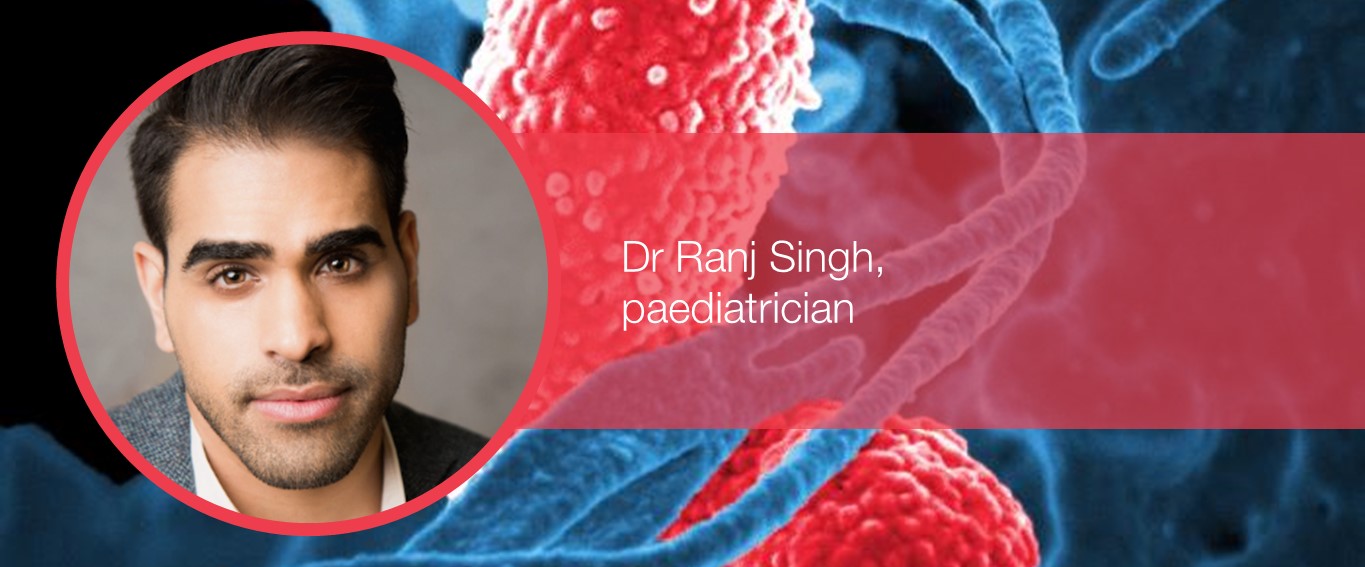Antibiotic resistant bacteria - bacteria that can no longer be killed by our drugs - is one of the biggest health challenges the world faces. The problem is caused by overuse and misuse of antibiotics, which means we all have a role to play in solving it, whether we’re a patient, health professional or health leader (find out how you can become an Antibiotic Guardian). In this blog seven health professionals give their perspective on how antibiotic resistance could impact everything from sexual health services, to childbirth.
As a paediatrician, I know that looking after a sick child can be a really worrying experience. Luckily, we have a great healthcare system that can help us to make sure our loved ones stay healthy. Modern technology and medicines have ensured our health and survival for decades, and we’ve become dependent on them. However, the worrying truth is that soon we may not be able to rely on them at all.
Imagine this: your child gets an infection… it starts off as a simple cold, caused by one of the common viruses. During a brief moment of weakness, bacteria hijack the original infection. The virus gets cleared, but now your child is faced with a secondary bacterial pneumonia – a potentially serious chest infection. As their health deteriorates, you take them to hospital where your worst nightmare comes true: because of our careless misuse of antibiotics, we have nothing that will be effective against that particular infection because bacteria have now become resistant to them. We’ve run out of options and have no choice but to watch and wait, and hope for the best.
Sadly, this isn’t just hypothetical. It’s a prediction of what may happen if we don’t act now to curb our misuse of antibiotics. Antibiotics have revolutionised healthcare, but we’ve forgotten how important they are. There are instances where they are completely appropriate and even life-saving, but we also need to remember that there are lots of times when we don’t need them. Not using them properly could mean that, one day; our loved ones may have no choice but to hope for the best. I don't ever want one of my patients to be in that situation. For the sake of our children’s future, we all have a duty to act today.
A decade ago, I watched a 37 year-old man die from sepsis. Opportunities to prevent his death had been missed, and I resolved then to work to combat this devastating condition that can arise as the body attempts to fight infection. Unchecked, sepsis progresses to multi-organ failure and death.
In the UK today, survival rates for sepsis have improved to 70%, and continue to rise thanks to better awareness and care.
If we can’t stop the infection, however, we can’t stop the sepsis. A world without effective antibiotics will mean that every one of the 100,000 people who develop sepsis each year in the UK - every one of the 18 million people with sepsis each year worldwide - could certainly die from simple infections like chest and water infections. A human could die from infection every second.
This world is getting closer. In British hospitals today patients are coming to harm because our first line antibiotics are no longer effective. We have to act now, we have to act decisively. If we don’t, healthcare will be plunged back decades and human life will be threatened.
As a sexual health doctor it’s a real concern to me that, as more and more STIs are diagnosed, we’re going to see increasingly resistant bacterial infections. In particular we know that gonorrhoea is already hard to deal with, with many countries reporting cases that very few, if any, antibiotics will treat. Untreated gonorrhoea can lead to severe infections and even infertility.
In my clinical practice I see common infections on a day to day basis. The symptoms of gonorrhoea can be distressing - like offensive discharge, abdominal pain and testicular pain. I don’t want to face a situation where I won’t be able to offer adequate treatment, particularly to younger people who are at the beginning of their sexual lives.
As an obstetrician a happy, healthy mum and baby is my ultimate aim. Pregnancy and the birth of a baby are a joyful time for everyone involved.
However, it’s important to remember that it is also a time of potential risk so it’s my responsibility to anticipate bad outcomes and reduce the likelihood of these occurring.
Deaths in childbirth have decreased massively because of modern medicine, but despite this, the incidence of an infection called sepsis has increased and it is currently the leading cause of deaths directly related to pregnancy.
At the moment these infections can be treated by newer antibiotics but if their effectiveness reduces it will be much harder to give mothers the care they need. The first hours and days after delivery are crucial bonding time for a mother and her baby and as a clinician I want to safeguard this important time. To do this I need antibiotics that work.

I’ve been a GP for many years and all through this time I have seen perceptions around the use of antibiotics change. We are now in a place where unless we all really pull together, the likelihood is we will start to see sepsis, which can be fatal, and other infections impact our communities like they did in the pre-antibiotic days.
My father trained as a GP in the thirties and I remember being a young boy and hearing conversations about the wonder drugs that were antibiotics.
We have moved on and now are in a very different place where bacteria that’s resistant to our antibiotics is becoming the norm not the exception and this is not acceptable. We need to take action now. If we are going to turn the tide, we must pull together and make this a joint effort from everyone or we’ll go back to the days where an infected cut or a chest infection could become incredibly serious.

When I started treating people with bacterial infections it was rare that I didn’t have tablet antibiotics that I could treat them with; rare that I needed to keep people in hospital to treat their infections. Now every week, I treat young women with last resort antibiotics for urinary tract infections. Rather than given them a simple 7-day tablet course, they have to stay in hospital for a week or more, or come to the hospital every day for an injection.
This has happened as antibiotic resistance has increased rapidly over the last 10 years. These patients who need antibiotics are frequently resistant to the first line antibiotics in the community. Often they have had an antibiotic for a kidney infection in the previous one to two years and that has wiped out the susceptible bacteria, allowing the resistant - more difficult to treat- bacteria to multiply and cause their current infection.
This is the commonest bacterial infection in women, and we all need to know how to prevent kidney infections. What we think of as a simple infection treatable with some tablet antibiotics, because of antibiotic resistance, is becoming a life-threatening infection requiring prolonged hospital treatment.
We need to we act today. We need to take personal responsibility for the antibiotics we prescribe and the antibiotics we take.
A future where surgery or infections could become life-threatening because antibiotics no longer work as they should is truly terrifying. Modern medicine has, through science, beaten many of the infections so dangerous to our grandparents. We must act now to make sure those same illnesses don’t become deadly for our children.

Some of my patients have had to be prescribed a variety of different antibiotics to get on top of their infection as each one in turn stopped working because of drug-resistant bacteria. This is not only unpleasant in terms of prolonged illness but also very worrying for both patients and health professionals alike. Losing our antibiotics would also affect other much-needed treatments such as chemotherapy for cancer, where it is essential to protecting the immune system from infections during life-saving treatment.
As pharmacists we can play a central role in educating and enabling our patients to cope with minor health problems, providing the advice and reassurance needed to reduce demands for antibiotics when they are not necessary or ineffective. If we all act now, there’s still time to turn the situation around, but it relies on each and every one of us taking personal responsibility not to expect or indeed provide antibiotics when other treatments could successfully be used.
What can you do?
Please join the fight against antibiotic resistance – sign up to be an Antibiotic Guardian and pledge to take one simple action that can preserve our some of our most precious medicines.
Images of bacteria: CDC / National Institute of Allergy and Infectious Diseases (NIAID)




